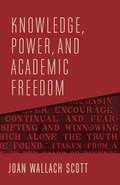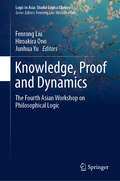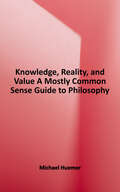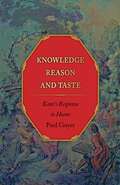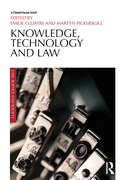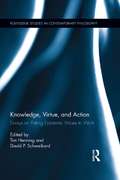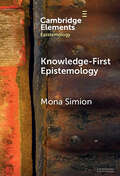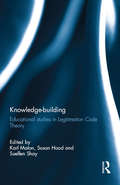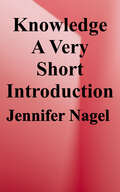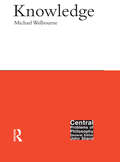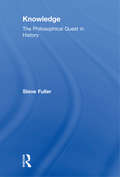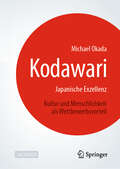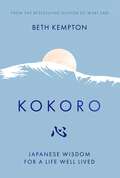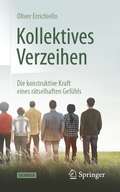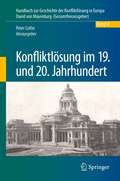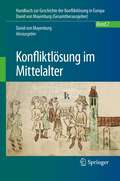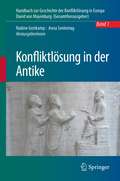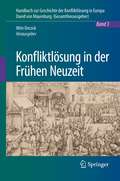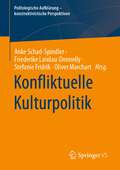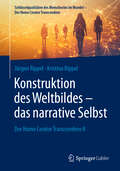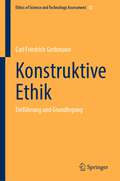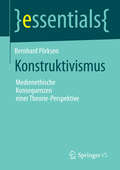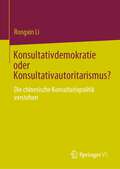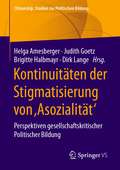- Table View
- List View
Knowledge, Power, and Academic Freedom (The Wellek Library Lectures)
by Joan Wallach ScottAcademic freedom rests on a shared belief that the production of knowledge advances the common good. In an era of education budget cuts, wealthy donors intervening in university decisions, and right-wing groups threatening dissenters, scholars cannot expect that those in power will value their work. Can academic freedom survive in this environment—and must we rearticulate what academic freedom is in order to defend it?This book presents a series of essays by the renowned historian Joan Wallach Scott that explore the history and theory of free inquiry and its value today. Scott considers the contradictions in the concept of academic freedom. She examines the relationship between state power and higher education; the differences between the First Amendment right of free speech and the guarantee of academic freedom; and, in response to recent campus controversies, the politics of civility. The book concludes with an interview conducted by Bill Moyers in which Scott discusses the personal experiences that have informed her views. Academic freedom is an aspiration, Scott holds: its implementation always falls short of its promise, but it is essential as an ideal of ethical practice. Knowledge, Power, and Academic Freedom is both a nuanced reflection on the tensions within a cherished concept and a strong defense of the importance of critical scholarship to safeguard democracy against the anti-intellectualism of figures from Joseph McCarthy to Donald Trump.
Knowledge, Proof and Dynamics: The Fourth Asian Workshop on Philosophical Logic (Logic in Asia: Studia Logica Library)
by Fenrong Liu Hiroakira Ono Junhua YuThis volume gathers selected papers presented at the Fourth Asian Workshop on Philosophical Logic, held in Beijing in October 2018. The contributions cover a wide variety of topics in modal logic (epistemic logic, temporal logic and dynamic logic), proof theory, algebraic logic, game logics, and philosophical foundations of logic. They also reflect the interdisciplinary nature of logic – a subject that has been studied in fields as diverse as philosophy, linguistics, mathematics, computer science and artificial intelligence. More specifically. The book also presents the latest developments in logic both in Asia and beyond.
Knowledge, Reality, and Value: A Mostly Common Sense Guide to Philosophy
by Michael HuemerThe world's best introduction to philosophy, Knowledge, Reality, and Value explains basic philosophical problems in epistemology, metaphysics, and ethics, such as: How can we know about the world outside our minds? Is there a God? Do we have free will? Are there objective values? What distinguishes morally right from morally wrong actions? The text succinctly explains the most important theories and arguments about these things, and it does so a lot less boringly than most books written by professors.
Knowledge, Reason, and Taste: Kant's Response to Hume
by Paul GuyerImmanuel Kant famously said that he was awoken from his "dogmatic slumbers," and led to question the possibility of metaphysics, by David Hume's doubts about causation. Because of this, many philosophers have viewed Hume's influence on Kant as limited to metaphysics. More recently, some philosophers have questioned whether even Kant's metaphysics was really motivated by Hume. In Knowledge, Reason, and Taste, renowned Kant scholar Paul Guyer challenges both of these views. He argues that Kant's entire philosophy--including his moral philosophy, aesthetics, and teleology, as well as his metaphysics--can fruitfully be read as an engagement with Hume. In this book, the first to describe and assess Hume's influence throughout Kant's philosophy, Guyer shows where Kant agrees or disagrees with Hume, and where Kant does or doesn't appear to resolve Hume's doubts. In doing so, Guyer examines the progress both Kant and Hume made on enduring questions about causes, objects, selves, taste, moral principles and motivations, and purpose and design in nature. Finally, Guyer looks at questions Kant and Hume left open to their successors.
Knowledge, Technology and Law (Law, Science and Society)
by Martyn Pickersgill Emilie CloatreThe relationships between knowledge, technologies, and legal processes are central to the constitution of contemporary societies. As such, they have come to provide the focus for a range of academic projects, across interdisciplinary legal studies and the social sciences. The domains of medical law and ethics, intellectual property law, environmental law and criminal law are just some of those within which the pervasive place and ‘impact’ of technoscience is immediately apparent. At the same time, social scientists investigating the making of technology and expertise - in particular, scholars working within the tradition of science and technology studies - frequently interrogate how regulation and legal processes, and the making of knowledge and technologies, are intermingled in complex ways that come to shape and define each other. This book charts the important interface between studies of law, science and society, as explored from the perspectives of socio-legal studies and the increasingly influential field of science and technology studies. It brings together scholars from both areas to interrogate the joint roles of law and science in the construction and stabilization of socio-technical networks, objects, and standards, as well as their place in the production of contemporary social realities and subjectivities.
Knowledge, Thought, and the Case for Dualism
by Richard FumertonThe relationship between mind and matter, mental states and physical states, has occupied the attention of philosophers for thousands of years. Richard Fumerton's primary concern is the knowledge argument for dualism - an argument that proceeds from the idea that we can know truths about our existence and our mental states without knowing any truths about the physical world. This view has come under relentless criticism, but here Fumerton makes a powerful case for its rehabilitation, demonstrating clearly the importance of its interconnections with a wide range of other controversies within philosophy. Fumerton analyzes philosophical views about the nature of thought and the relation of those views to arguments for dualism, and investigates the connection between a traditional form of foundationalism about knowledge, and a foundationalist view about thought that underlies traditional arguments for dualism. His book will be of great interest to those studying epistemology and the philosophy of mind.
Knowledge, Virtue, and Action: Putting Epistemic Virtues to Work (Routledge Studies in Contemporary Philosophy #51)
by David P. Schweikard Tim HenningThis volume brings together recent work by leading and up-and-coming philosophers on the topic of virtue epistemology. The prospects of virtue-theoretic analyses of knowledge depend crucially on our ability to give some independent account of what epistemic virtues are and what they are for. The contributions here ask how epistemic virtues matter apart from any narrow concern with defining knowledge; they show how epistemic virtues figure in accounts of various aspects of our lives, with a special emphasis on our practical lives. In essence, the essays here put epistemic virtues to work.
Knowledge-First Epistemology: A Defence (Elements in Epistemology)
by Mona SimionKnowledge-first epistemology places knowledge at the normative core of epistemological affairs: on this approach, central epistemic phenomena are to be analyzed in terms of knowledge. This Element offers a defence of an integrated, naturalistic knowledge-first account of justified belief, reasons, evidence and defeat, permissible assertion and action, and the epistemic normativity of practical and theoretical reasoning. On this account, the epistemic is an independent normative domain organized around one central etiological epistemic function: generating knowledge. In turn, this epistemic function generates epistemic norms of proper functioning that constitute the epistemic domain, and govern moves in our epistemic practice, such as forming beliefs, asserting, and reasoning. This title is also available as Open Access on Cambridge Core.
Knowledge-building: Educational studies in Legitimation Code Theory (Legitimation Code Theory)
by Susan Hood Karl Maton Suellen ShayEducation and knowledge have never been more important to society, yet research is segmented by approach, methodology or topic. Legitimation Code Theory or ‘LCT’ extends and integrates insights from Pierre Bourdieu and Basil Bernstein to offer a framework for research and practice that overcomes segmentalism. This book shows how LCT can be used to build knowledge about education and society. Comprising original papers by an international and multidisciplinary group of scholars, Knowledge-building offers the first primer in this fast-growing approach. Through case studies of major research projects, Part I provides practical insights into how LCT can be used to build knowledge by: - enabling dialogue between theory and data in qualitative research - bringing together quantitative and qualitative methodologies in mixed-methods research - relating theory and practice in praxis - conducting interdisciplinary studies with systemic functional linguistics Part II offers a series of studies of pressing issues facing knowledge-building in education and beyond, encompassing: - diverse subject areas, including physics, English, cultural studies, music, and design - educational sites: schooling, vocational education, and higher education - practices of research, curriculum, pedagogy and assessment - both education and informal learning contexts, such as museums and masonic lodges Carefully sequenced and interrelated, these chapters form a coherent collection that gives a unique insight into one of the most thought-provoking and innovative ways of building knowledge about knowledge-building in education and society to have emerged this century. This book is essential reading for all serious students and scholars of education, sociology and linguistics.
Knowledge: A Very Short Introduction (Very Short Introductions Series)
by Jennifer NagelWhat is knowledge? How does it differ from mere belief? Do you need to be able to justify a claim in order to count as knowing it? How can we know that the outer world is real and not a dream? <p><p>Questions like these are ancient ones, and the branch of philosophy dedicated to answering them—epistemology—has been active for thousands of years. In this thought-provoking Very Short Introduction, the author considers these classic questions alongside new puzzles arising from recent discoveries about humanity, language, and the mind. <p><p>The author explains the formation of major historical theories of knowledge, and shows how contemporary philosophers have developed new ways of understanding knowledge, using ideas from logic, linguistics, and psychology. Covering topics ranging from relativism and the problem of scepticism to the trustworthiness of internet sources, she examines how progress has been made in understanding knowledge, using everyday examples to explain the key issues and debates about the series. <p><p>The Very Short Introductions series from Oxford University Press contains hundreds of titles in almost every subject area. These pocket-sized books are the perfect way to get ahead in a new subject quickly. Our expert authors combine facts, analysis, perspective, new ideas, and enthusiasm to make interesting and challenging topics highly readable.
Knowledge: Scots Philosophical Monograph (Central Problems of Philosophy #3)
by Michael WelbourneWhat is it about knowledge that makes us value it more highly than mere true belief? This question lies at the heart of epistemology and has challenged philosophers ever since it was first posed by Plato. Michael Welbourne's examination of the historical and contemporary answers to this question provides both an excellent introduction to the development of epistemology but also a new theory of the nature of knowledge. The early chapters introduce the main themes and questions that have provided the context for modern discussions. The Platonic beginnings, Cartesian individualism and the tripartite analyses of knowledge are examined in turn. In the second half of this book, the focus shifts from conceptual analysis to an examination of the social practices surrounding knowledge, placing special emphasis on the notion of testimony. The author argues originally and persuasively that our idea of knowledge has its roots in communicative practices and that thinking about how testimony works as a source of beliefs actually gives us a handle on the very idea of knowledge itself. This book will be essential reading for anyone interested in epistemology, the philosophy of language, or the intersection between the two areas.
Knowledge: The Philosophical Quest in History
by Steve FullerThe theory of knowledge, or epistemology, is often regarded as a dry topic that bears little relation to actual knowledge practices. Knowledge: The Philosophical Quest in History addresses this perception by showing the roots, developments and prospects of modern epistemology from its beginnings in the nineteenth century to the present day. Beginning with an introduction to the central questions and problems in theory of knowledge, Steve Fuller goes on to demonstrate that contemporary epistemology is enriched by its interdisciplinarity, analysing keys areas including: Epistemology as Cognitive Economics Epistemology as Divine Psychology Epistemology as Philosophy of Science Epistemology as Sociology of Science Epistemology and Postmodernism. A wide-ranging and historically-informed assessment of the ways in which man has - and continues to - pursue, question, contest, expand and shape knowledge, this book is essential reading anyone in the Humanities and Social Sciences interested in the history and practical application of epistemology.
Kodawari: Japanische Exzellenz - Kultur und Menschlichkeit als Wettbewerbsvorteil
by Michael OkadaDieses Buch ist kein Ratgeber, keine Methode, kein 10-Schritte-Plan. Es ist ein Aufruf, anders zu denken: tiefer, menschlicher, mutiger und vielleicht auch ein wenig japanischer. „Kodawari&“ steht für das Streben nach Exzellenz—den Mut, nicht effizienter, sondern besser zu sein. Es ist eine Neuausrichtung auf das, was wirklich zählt, und definiert neue Ansätze für eine Wirtschaft, die mehr ist als reine Zahlen. Arbeiten Sie bedeutsamer, nicht schneller. Produzieren Sie besser, nicht mehr. Seien Sie unverwechselbar, nicht lauter. Der Deutsch-Japaner Michael Okada, aufgewachsen zwischen Direktheit und Demut, Tempo und Tiefe, zeigt eine einzigartige Perspektive: Eine, die Wirtschaft menschlicher und bedeutsamer denkt. Ein Buch für alle, die bereit sind, die Perspektive zu wechseln und das Außergewöhnliche zu leben.
Kokoro: Japanese Wisdom for a Life Well Lived
by Beth Kemptonkokoro [n.] intelligent heart, feeling mind One year. Two devastating losses. Three sacred Japanese mountains. A major life transition, a heart full of grief and a revelation that changes everything. Join Japanologist Beth Kempton on a pilgrimage through rural Japan in search of answers to some of life's biggest questions: How do we find calm in the chaos and beauty in the darkness? How do we let go of the past and stop worrying about the future? What can an awareness of impermanence teach us about living well?Together you will journey to the deep north of Japan, hike ancient forests, watch the moon rise over mountains of myth and encounter a host of wise teachers along the way - Noh actors, chefs, taxi drivers, coffee shop owners, poets, philosophers and the spirits that inhabit the land. You will contemplate the true nature of time at one of the world's strictest Zen temples and nothing will be quite the same again.This book is an invitation to cultivate stillness and contentment in an ever-changing, uncertain world. It all begins with the kokoro, a profound Japanese term which represents the intelligent heart, the feeling mind and the embodied spirit of every human being.To explore the kokoro is to explore the very essence of what it means to be human in this tough yet devastatingly beautiful world. When you learn to live guided by the light in your kokoro, everything changes, and anything is possible.
Kollektives Verzeihen: Die konstruktive Kraft eines rätselhaften Gefühls
by Oliver ErrichielloDas kollektive Verzeihen steht in seiner Rätselhaftigkeit der Liebe in nichts nach. Wir Menschen sind unergründliche Wesen. Zwar agieren wir meist bedächtig und rational und doch lassen sich viele Handlungen und Entscheidungen scheinbar nicht logisch herleiten. Das Verzeihen – jeder kennt es und hat es erfahren – gehört dazu. Verzeihen ist eines der wichtigsten und spannendsten Phänomene menschlicher Kommunikation. Das Buch beantwortet Fragen wie: Warum verzeihen wir einigen Menschen und anderen nicht? Warum braucht Verzeihen Zeit? Warum verzeihen Menschen einander seit jeher – oder lehnen eben gerade den Akt des Verzeihens ab? Verzeihen wir einzelnen Menschen im persönlichen Umfeld leichter oder schwerer als einer Gruppe von Menschen? Und vor allem: Warum ist das kollektive Verzeihen zeit- und kulturübergreifend wirksam? Im Zeitalter der hyperkomplexen und total vernetzten Welt, die keine Pausen mehr kennt, ist Verzeihen unerlässlich. Das Buch regt zum Nachdenken an und bietet wertvolle Impulse, um das eigene und das soziale Handeln besser zu verstehen.
Konfliktlösung im 19. und 20. Jahrhundert (Handbuch zur Geschichte der Konfliktlösung in Europa #4)
by Peter CollinDas vierbändige „Handbuch zur Geschichte der Konfliktlösung in Europa“ beschäftigt sich mit rechtlichen und außerrechtlichen Wegen der Entscheidung von Konflikten zwischen einzelnen Menschen sowie zwischen Personen und ihren Obrigkeiten. Das von Expertinnen und Experten aus vielen europäischen Ländern geschriebene Handbuch soll als zentrales Referenzmedium für die historische Dimension aller Aspekte der Streitentscheidung dienen. Der Aufbau des Werks orientiert sich an den vier Epochen Antike, Mittelalter, Frühe Neuzeit und 19./20. Jahrhundert. Nach einer Einführung in die jeweilige Epoche werden die für den Zeitabschnitt kennzeichnenden Akteure, Verfahren und Institutionen vorgestellt sowie Kernfragen und Zentralprobleme der Streitentscheidung in zeittypischen Konfliktfeldern behandelt. Die europäische Perspektive des Handbuchs schlägt sich in Überblicken zu einzelnen Ländern, Regionen und Rechtskulturen nieder. Ausführliche Hinweise auf die weiterführende Literatur runden die Darstellung ab. Band 4 umfasst Beiträge zum 19. und 20. Jahrhundert.
Konfliktlösung im Mittelalter (Handbuch zur Geschichte der Konfliktlösung in Europa #2)
by David Von MayenburgDas vierbändige „Handbuch zur Geschichte der Konfliktlösung in Europa“ beschäftigt sich mit rechtlichen und außerrechtlichen Wegen der Entscheidung von Konflikten zwischen einzelnen Menschen sowie zwischen Personen und ihren Obrigkeiten. Das von Expertinnen und Experten aus vielen europäischen Ländern geschriebene Handbuch soll als zentrales Referenzmedium für die historische Dimension aller Aspekte der Streitentscheidung dienen.Der Aufbau des Werks orientiert sich an den vier Epochen Antike, Mittelalter, Frühe Neuzeit und 19./20. Jahrhundert. Nach einer Einführung in die jeweilige Epoche werden die für den Zeitabschnitt kennzeichnenden Akteure, Verfahren und Institutionen vorgestellt sowie Kernfragen und Zentralprobleme der Streitentscheidung in zeittypischen Konfliktfeldern behandelt. Die europäische Perspektive des Handbuchs schlägt sich in Überblicken zu einzelnen Ländern, Regionen und Rechtskulturen nieder. Ausführliche Hinweise auf die weiterführende Literatur runden die Darstellung ab. Der vorliegende Band 2 umfasst Beiträge zum Mittelalter.
Konfliktlösung in der Antike (Handbuch zur Geschichte der Konfliktlösung in Europa #1)
by Nadine Grotkamp Anna SeelentagDas vierbändige „Handbuch zur Geschichte der Konfliktlösung in Europa“ beschäftigt sich mit rechtlichen und außerrechtlichen Wegen der Entscheidung von Konflikten zwischen einzelnen Menschen sowie zwischen Personen und ihren Obrigkeiten. Das von Expertinnen und Experten aus vielen europäischen Ländern geschriebene Handbuch soll als zentrales Referenzmedium für die historische Dimension aller Aspekte der Streitentscheidung dienen.Der Aufbau des Werks orientiert sich an den vier Epochen Antike, Mittelalter, Frühe Neuzeit und 19./20. Jahrhundert. Nach einer Einführung in die jeweilige Epoche werden die für den Zeitabschnitt kennzeichnenden Akteure, Verfahren und Institutionen vorgestellt sowie Kernfragen und Zentralprobleme der Streitentscheidung in zeittypischen Konfliktfeldern behandelt. Die europäische Perspektive des Handbuchs schlägt sich in Überblicken zu einzelnen Ländern, Regionen und Rechtskulturen nieder. Ausführliche Hinweise auf die weiterführende Literatur runden die Darstellung ab. Der vorliegende Band 1 umfasst Beiträge zur Antike.
Konfliktlösung in der Frühen Neuzeit (Handbuch zur Geschichte der Konfliktlösung in Europa #3)
by Wim DecockDas vierbändige „Handbuch zur Geschichte der Konfliktlösung in Europa“ beschäftigt sich mit rechtlichen und außerrechtlichen Wegen der Entscheidung von Konflikten zwischen einzelnen Menschen sowie zwischen Personen und ihren Obrigkeiten. Das von Expertinnen und Experten aus vielen europäischen Ländern geschriebene Handbuch soll als zentrales Referenzmedium für die historische Dimension aller Aspekte der Streitentscheidung dienen. Der Aufbau des Werks orientiert sich an den vier Epochen Antike, Mittelalter, Frühe Neuzeit und 19./20. Jahrhundert. Nach einer Einführung in die jeweilige Epoche werden die für den Zeitabschnitt kennzeichnenden Akteure, Verfahren und Institutionen vorgestellt sowie Kernfragen und Zentralprobleme der Streitentscheidung in zeittypischen Konfliktfeldern behandelt. Die europäische Perspektive des Handbuchs schlägt sich in Überblicken zu einzelnen Ländern, Regionen und Rechtskulturen nieder. Ausführliche Hinweise auf die weiterführende Literatur runden die Darstellung ab. Der vorliegende Band 3 umfasst Beiträge zur Frühen Neuzeit.
Konfliktuelle Kulturpolitik (Politologische Aufklärung – konstruktivistische Perspektiven)
by Oliver Marchart Anke Schad-Spindler Friederike Landau-Donnelly Stefanie FridrikDieser Sammelband vereint Beiträge aus unterschiedlichen Bereichen der Kulturpolitikforschung. Impulsgebend für den Band war das Forschungsprojekt „Agonistische Kulturpolitik (AGONART) – Fallstudien zur konfliktiven Transformation von Kulturstandorten“. Dieses verstand sich als interdisziplinärer Beitrag zwischen qualitativ-empirischer Grundlagenforschung in Politikwissenschaft (mit Schwerpunkt auf Kulturpolitik) und politischer Theorie (mit Schwerpunkt auf Konflikttheorie bzw. agonistischer Demokratietheorie). Das Buch regt somit zu einer wissenschaftlichen Auseinandersetzung mit Kulturpolitik(forschung) in Österreich, dem deutschsprachigen Raum und darüber hinaus an.
Konstruktion des Weltbildes – das narrative Selbst: Der Homo Creator Transcendens II (Schlüsselqualitäten des Menschseins im Wandel - Der Homo Creator Transcendens)
by Jürgen Rippel Kristina RippelGeschichten zu erzählen ist ein archetypischer Aspekt des Menschseins. In der Erkundung seiner narrativen Schlüsselqualität nimmt uns der Homo Creator Transcendens mit auf die Reise zu uns selbst. Wir gewinnen tiefe Einblicke in den Aufbau des Welt- und Selbstbildes, wandern durch die Verständnislandschaften von Werten, Ethik und Moral und erkennen uns selbst in unseren Kompetenzen und Begabungen. Wir wechseln die Rahmen, die unser Leben bestimmen und überschreiten damit immer wieder die Grenze des Offensichtlichen, hinein ins Verborgene. Dort versorgt uns die Transzendenz mit wertvollen Erkenntnissen und lädt uns ein, das individuelle Denken und Handeln zu reflektieren. Damit öffnet sich auch ein ganz anderer Blick auf die Intelligenz. In diesem Wissen lernen wir das authentische Selbst kennen und lassen am Ende die neu erblühte Persönlichkeit in der Heldenreise freien Lauf, um uns wie neu geboren zu fühlen. Mit den gewonnenen Einsichten und neuen Perspektiven auf uns selbst, betrachten wir das Wirtschaften und das Miteinanderleben in einem ganz anderen Licht.
Konstruktive Ethik: Einführung und Grundlegung (Ethics of Science and Technology Assessment #52)
by Carl Friedrich GethmannDas Buch bietet einen systematischen Gesamtentwurf der Allgemeinen Ethik und damit für den interessierten Leser einen Zugang zu den wichtigsten Fragestellungen der Disziplin Ethik. Dazu werden im Anschluß an eine systematische und historische Einleitung propädeutische Fragen behandelt und die bekannten drei Paradigmen ethischer Reflexion (Tugendethik, Nutzenethik und Verpflichtungsethik) in Orientierung an den klassischen Texten dargestellt. Darauf aufbauend wird die mögliche Komplementarität dieser Paradigmen im Sinne eines Filtermodells sukzessiver ethischer Urteilsbildung entwickelt. Das Buch zeigt, ausgehend von den sprachphilosophischen und wissenschaftsphilosophischen Arbeiten der Erlanger Schule, darüber hinaus, daß moralische Verpflichtungen und Berechtigungen mit ihren unterschiedlichen Graden von Verbindlichkeit ohne starke „realistische“ und wertphilosophische Unterstellungen rekonstruiert werden können.
Konstruktivismus: Medienethische Konsequenzen einer Theorie-Perspektive (essentials)
by Bernhard PörksenDieser Essay stellt sich einem doppelten Anspruch: Zum einen soll - kurz und knapp - in die Erkenntnistheorie des Konstruktivismus eingeführt werden, die in den verschiedensten Disziplinen (Medien- und Kommunikationswissenschaft, Soziologie etc. ) für Aufsehen gesorgt hat. Zum anderen gilt es zu zeigen, in welcher Weise die Kernaussagen und Prämissen des Konstruktivismus (Abschied von der Idee absoluter Wahrheitserkenntnis, Orientierung am ,,Beobachter" bzw. dem Erkennenden, Akzeptanz der Pluralität von Wirklichkeitskonstruktionen etc. ) für die medienethischen Debatten folgenreich sind. Deutlich wird, dass die konstruktivistischen Einsichten zu einer grundsätzlichen Skepsis inspirieren und eine radikale Verantwortungsethik begründbar machen. Jeder ist, so das hier entfaltete Argument, für seine Wirklichkeitskonstruktion verantwortlich.
Konsultativdemokratie oder Konsultativautoritarismus?: Die chinesische Konsultativpolitik verstehen
by Rongxin LiIn diesem Buch wird die chinesische Politik theoretisiert, insbesondere Chinas "deliberative Demokratie (xieshang minzhu 协商民主)". In einem vergleichenden Rahmen zwischen China und dem Westen hinterfragt der Autor den Anspruch der chinesischen Regierung, die Bürger zu repräsentieren, und zeigt dem Leser, wie all diese Konzepte innerhalb der chinesischen Ideologie, des demokratischen Diskurses und der Regierungsführung zusammenwirken und in welchem Verhältnis sie zum chinesischen Autoritarismus stehen. Vor allem stellt dieses Buch eine nachhaltige Hybridisierung der politischen Theorie dar, die weder eine einfache demokratisch-autoritäre Dichotomie noch eine Neuinterpretation der offiziellen Propaganda ist. Diese Studie wird für Wissenschaftler der chinesischen Politik und Staatskunst von Interesse sein, da sie Licht auf einen neu entstehenden Staatsdiskurs wirft - das chinesische xieshang minzhu. Noch wichtiger ist, dass dieses Buch über eine einfache rhetorische und sprachliche Verwendung der "deliberativen Demokratie" im westlichen Sinne hinausgeht und vielmehr den beratenden Charakter der chinesischen Politik hervorhebt, der den chinesischen Autoritarismus begünstigt und festigt.
Kontinuitäten der Stigmatisierung von ,Asozialität': Perspektiven gesellschaftskritischer Politischer Bildung (Citizenship. Studien zur Politischen Bildung)
by Dirk Lange Helga Amesberger Judith Goetz Brigitte HalbmayrMag.a Dr.in Helga Amesberger ist Senior Researcher am Institut für Konfliktforschung, Wien. MMag.a Judith Goetz ist Universitätsassistentin am Zentrum für Lehrer*innenbildung der Universität Wien.Mag.a Dr.in Brigitte Halbmayr ist Senior Researcher am Institut für Konfliktforschung, Wien.Dr. Dirk Lange ist Universitätsprofessor für die Didaktik der Politischen Bildung am Institut für Politikwissenschaft der Leibniz Universität Hannover.
